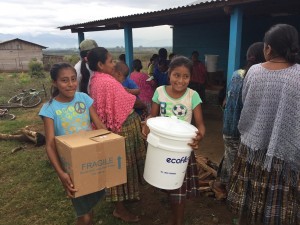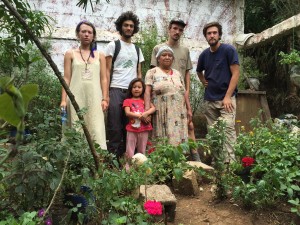Guatemala Solidarity Project Quarterly Report
First Quarter of the Mayan Year Kajib’ No’j (February 21, 2016 – February 19, 2017)
During the first quarter of the year Kajb’ No’j, the Guatemala Solidarity Project continued our work in solidarity with the courageous nonviolent struggle of indigenous and peasant communities in defense of their rights and the Mother Earth.
Many of those receiving this report have donated to support this work, and we thank you greatly for this support. Your donations in their entirety go to our partners in Guatemala and are not used for overhead costs. We follow the direction of our partners in determining where funds go. During the first quarter of the year Kajib’ No’j, most funds were used to support political prisoners, orphans and other victims of repression, and the purchase of water filters for communities who have recently been burned down in government attacks.
Such support is crucial. In almost all of our partner communities, the vast majority of children suffer from chronic malnutrition. In prison, community leaders held on fraudulent charges are beaten and pass days without being fed. We stand with these sisters and brothers in trying to gain them access to things many of us take for granted – like three meals a day or a clean cup of water. Please visit out webpage now to make a donation of any size.
We also recognize that the overwhelming human suffering and large scale environmental destruction which occurs in Guatemala will not be ended by such relief work. That is why we seek to denounce and destroy the systematic exploitation and militarization of Guatemala’s primarily indigenous population. Unfortunately this exploitation and militarization is often directly supported, even coordinated, by the United States government and multinational corporations. In this quarterly report, we feature the report of a recent delegation of GSP activists who witnessed this repression first hand and were inspired by the communities and activists organizing for water, land and justice:
Delegation members learn about the impressive agro-ecological production work in Xinca communities
This delegation was born out of the belief that the United States government plays an active and ongoing role in the exploitation, repression and violence directly targeted against peasants in resistance to capitalist “development”. We did not have a clear idea of what we were going to see, but our desire was to personally witness the devastating effects of U.S. foreign policy.
During the months of April and May, Guatemala Solidarity Project (GSP) delegates from the United States took part in several actions in support of indigenous land and water rights. These actions included visiting communities in resistance in different regions of Guatemala as well as participating with thousands of Guatemalan farmers and activists in La Marcha Por El Agua (The March for Water). We met with communities in Coban, the Polochic Valley, Santa Maria Xalapan, and San Jose del Golfo to discuss their struggles. Although each community experiences a unique set of problems, the overwhelmingly common thread is exploitation by large transnational corporations who we have seen frequently ignore international and Guatemalan law in their pursuit of profits. More specifically, watersheds and ecosystems are being devastated by mega projects and monocrop agriculture, leaving entire populations in desperate poverty. Over the course of this delegation, we have confirmed our belief that companies from the US — and US supported institutions like the World Bank — are the ones providing the investment and loans that support these destructive corporations.
April 2016 Polochic Valley
In Panzos, GSP delegates joined with members of the Committee of Peasant Unity (CUC) and delivered 120 potable water filters to four different communities. These filters were purchased thanks to donors in the US. The beneficiary communities included San Miguel Cotoxja, Parana, El Rodeo and Nuevo Barrio Santa Maria. Following the delivery, GSP delegates met with the people of Nuevo Barrio Santa Maria and learned about the hardships facing this community.
Chronic malnutrition and extreme poverty are the direct results of the theft of indigenous lands, contaminated soil and a lack of water. These problems are exasperated by the monocropping of african palm and sugarcane by transnational corporations throughout the valley. GSP continues to support the courageous Q’eqchi peasants fighting to stay on their land despite years of starvation.
Video of the March, 2011 “eviction” of hundreds of q’eqchi’ families in northeastern Guatemala. The GSP needs your support to purchase water filters to help these communities avoid dangerous parasites and bacteria that lead to increased starvation
Community leaders distribute water filters to the families of Nuevo Barrio Santa Maria
One family receives their filter
April 2016 La Marcha Por El Agua
In partnership with CUC, GSP representatives joined La Marcha Por El Agua outside the city of Escuintla on April 19th. The march began on April 10th in Tecun Uman, a city on the Mexican border, and culminated in Guatemala City on April 22nd, Earth Day. Delegates marched for the final four days in direct solidarity with indigenous and peasant communities in resistance. The main goal of the march was to apply pressure to the newly elected government of Guatemala and hold it accountable to promises made during previous administrations and by the new president, Jimmy Morales, while he was a candidate. Participants demanded the halt of severe water contamination and recognition of legal title to indigenous land.
Thousands of activists marched countless miles before arriving in Guatemala City to demand access to clean water
May 2016 Santa Maria Xalapan
On May 4th, representatives of GSP traveled to the municipality of Jalapa, to request permission from the Indigenous Xinka Parliament of Santa Maria Xalapan to stay in their communities on the mountain. After a successful meeting, GSP delegates received permission to live in the community of La Paz for one month. Xalapan claims autonomy from the Guatemalan government based on legal title originally issued by the Spanish monarchy which predates the creation of the Guatemalan state, and should ensure their legal right to Xinka sovereignty over the mountain. Predictably, the government does not respect this claim and over half of the original Xinka concession has been stolen over the centuries. Furthermore, the Guatemalan government continually fails to provide basic services, such as health care and paved roads, which intensifies the Xinka necessity for self-sovereignty.
Working with OPOXEX– an organization dedicated to the preservation of Xinka culture with a strong focus on organic agriculture and herbal medicine– we coordinated meetings in ten different communities. Communities included El Duraznal, El Pito de la Laguna, La Cuchilla, San Francisco, La Paz, Yerba Buena, El Roblar, El Durazno, Los Lopez and El Volcan Palo Verde. During these meetings we learned about Xinka autonomy, as well as the soil contamination and lack of water that plague these villages. With the increasing effects of global warming and deforestation along with pollution and water theft from mega-projects such as the Escobal silver and gold mine which is directly below the Xinka communities of Xalapan, the people here are left without adequate water. Santa Maria Xalapan presents itself as a community in peaceful resistance to transnational exploitation in the form of mining. Each community we visited conveyed that they were being affected by mega-projects in general, especially the Escobal mine. Although the Xinka of Xalapan and neighboring municipalities have voted overwhelmingly against mining projects in the region, construction on the Escobal mine began under the protection of government-imposed martial law, the kind of community-oppression tactics Guatemalan military leaders have learned over the years at the US Army School of the Americas. Today this mine is the 3rd largest silver mine in the world, extracting over 20 million ounces of silver concentrate in 2015.
GSP delegates help prepare the soil for planting
It’s all about the soil: Xinca communities are organizing to learn and promote a type of agroecological production that builds up the soil, supports healthy consumption and relies on minimum resources. From mechanical pumps that don’t need fossil fuels to systematic composting, gaining food security can also strike a blow against global warming and environmental destruction.
May 2016 La Puya and La Puyita
On May 22nd, the GSP delegation and a representative from Xalapan traveled to just outside the small town of San Jose del Golfo to meet with the permanent resistance encampment called La Puya, which is at the entrance to El Tambor mine. Similarly to El Escobal Mine, the government rejected the disapproval of the communities affected by this mine, in favor of the interests of a transnational corporation intent on exploiting the people and land of Guatemala. The resistance has been stationed outside of the mine for more than four years, with activists taking twenty four hour shifts. On February 22nd, a Guatemalan judge ordered the suspension of mining activities due to the efforts of La Puya and their legal team. The company disobeyed this judge’s decision, extracting gold and silver by helicopter and then later paying locals to carry sacks on their backs. La Puya exposed this illegal action and since May 13th mining has stopped.
Another component to this resistance is La Puyita (The Little Puya)- a different live-in protest stationed outside of the Ministry of Energy and Mining in Guatemala City. Similar to La Puya, activists take shifts being present and in vocal resistance to the illegal activities of this mine. Participants in this action maintain that the protest will persevere until El Tambor Mine is permanently shut down.
Graffiti near La Puya reads “We are all La Puya”
GSP delegates met with activists at La Puyita, in front of the Ministry of Energy and Mining.
In conclusion, the lack of access to clean water faced by every one of these communities is not a coincidence; it is a direct result of exploitation caused by transnational corporations. As one activist in the struggle at La Puya informed us, one mine uses as much water in one hour as one family of five uses in 20 years. We denounce this clear injustice. This delegation, working with OPOXEX, will be raising funds for the construction of permanent, communal water deposits in the ten communities we visited in Xalapan. While this is a temporary solution to a much larger problem, we hope these water storage tanks will provide a relief from the water shortage. With this potential water security the people of Xalapan will be able to peacefully and boldly continue their struggle for autonomy and food sovereignty.
GSP delegates with allies in Palo Verde Xalapan
A Xinka ceremony began the meeting between OPOXEX and the delegates from Guatemala Solidarity Project, the meeting took place in newly constructed OPOXEX headquarters.
This is a water deposit currently in use in Xalapan, notice the lack of cementlining and the receding water line.
Local herbs used for medicinal purposes.
GSP delegates discuss and perform live on Xalapan’s local television station, Channel 2.
Here is the Juventud, the youth counsel of OPOXEX. They are discussing their coffee project.
Here is another water deposit, again notice the lack of cement lining.
GSP delegates worked with the Juventud to grind and package coffee.
Members of the Juventud tend the roasting coffee beans.
Local man prepares a garden for planting.
GSP delegates learn about using composite to help grow plants.
Taking time to relax and play music before lunch.
Delegates viewed bones of an exhumed body at the Kaji Tulam House of Memory, and learned about efforts to exhume bodies and hold officials responsible for atrocities committed against indigenous people.
Companera Mercedes shows GSP delegates her water deposit. Again notice the lack of cement lining.
This is the village of El Duranzo on the mountain of Xalapan.




























